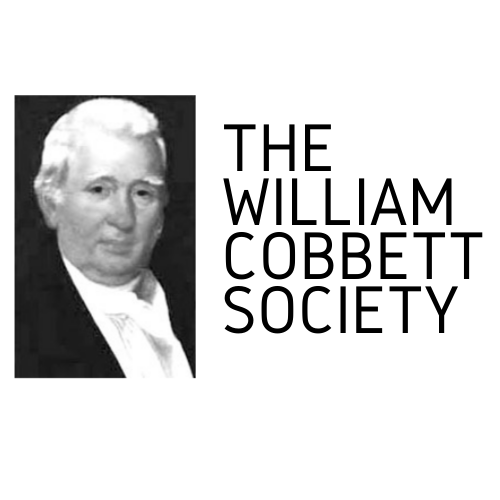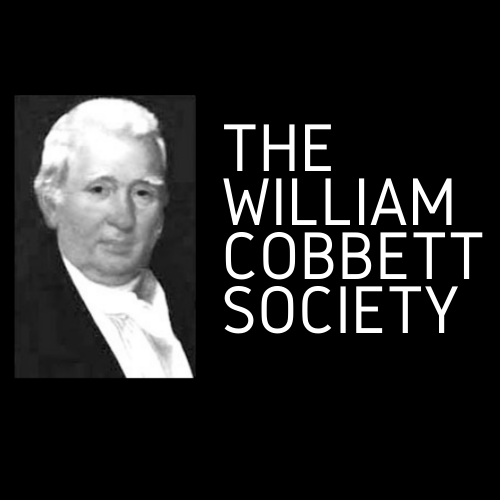With Colston’s statue thrown into the river and questions being asked about the attitudes to slavery of other historical figures, we thought the Society should make some comments about what Cobbett had to say about slavery.
Unfortunately it has to be said that Cobbett has written some blatantly prejudiced pieces about black people – both slaves in the British (and French) colonies and the few blacks in Britain at the time. (He also happened to make similarly unacceptable comments about Jews, Quakers and, for some time, Scots). To be honest about Cobbett we have to acknowledge these and to condemn him for such attitudes. However we would strenuously resist any attempts for such unacceptable views to be used as a reason not to celebrate Cobbett’s positive contributions, which are many, including his central role in extending the rights of the oppressed and the disenfranchised in Britain.
This note attempts briefly to summarise and put into context Cobbett’s views on race and slavery.
Central to Cobbett’s comments on slavery was his hatred of Wilberforce, who he saw as self-righteously promoting anti-slavery abroad while acting against the interests of the oppressed in Britain, on behalf of whom Cobbett spent his life campaigning. Cobbett’s criticisms of Wilberforce were well founded – Wilberforce voted for the suspension of Habeas Corpus in 1795, for Pitt’s ‘Gagging Acts’, opposed rights to set up unions, opposed an enquiry into the ‘Peterloo Massacre’ and supported the subsequent’ Six Acts’ (banning ANY meeting for radical reform). Cobbett and other radicals were highlighting the hypocrisy of upper class anti-slavery campaigners supporting ‘white slavery’ in factories – they were not supporting black slavery.
To strengthen his criticism of Wilberforce’s concern for the slaves, Cobbett did however insist that blacks were ‘different’ and compared them unfavourably – in mental capacity and sensitivity – with the English white working class (Ref A 1817; B PR 1821). And with his relentless support of impoverished workers in England, Cobbett was guilty of using a mythical view of the happy black slave in plantations as a contrast to working conditions in England – and, added to that, support for the view that the chaos following the notorious St Domingo (Haiti – then French) slave riots in 1792 had been caused by giving slaves having freedom. (Ref C, 1823). Cobbett did not, like others, make money out of slaves (or inherit it from those who did) – what he did do was make disparaging remarks about any group he thought threatened ordinary English working people.
In the early years of his Political Register Cobbett made gratuitously racist comments, such as in 1804 about ‘negroes made for servitude’ (Ref D ) and about relationships between black men and white women in England (Ref E). His later reports on freed American blacks (Ref F) following his time in America in 1817-1819 still described them as ‘a disorderly, improvident set of beings’.
However his attitude to slavery itself improved over time. By 1808 he wrote ‘if the thing can be I shall be glad to see the blacks as free, in every respect, as the whites’ (Ref G). In 1830 (Ref H May 29th 1830) Cobbett asserted “I hold all slavery in abhorrence,” and that he never used sugar, coffee or rum because they were the produce of slavery. In 1832 his electoral victory in Oldham was helped by the votes of non-conformists and meetings of the Anti Slavery Society, who were revolted by the slavery connections of his Whig and Tory opponents. And in 1833 when he was in Parliament he supported the emancipation of the slaves in British colonies (strenuously opposing compensation to slave owners), though never missing an opportunity of contrasting parliament’s ‘solicitude for the Negroes’ with its indifference to the sufferings of the factory slaves at home, (Ref I)
It is relevant in considering Cobbett’s views to point out that his style was always bombastic and prone to exaggeration. In his defence it is also relevant to point out that in his life he took great personal risk to call out the excesses of the establishment, in an era of a grossly unrepresentative parliament and of the law of ‘seditious libel’ which was used against him in 4 court cases and led to 2 years in jail. He consistently objected to the treatment of the Irish by the British and to laws giving lesser rights to Roman Catholics. He also objected to Britain’s military adventurism and to British financiers making money without any regard to the conditions of the workers in foreign lands (Ref J ).
He made a massive contribution to the awareness of the plight of working people (particularly agricultural) in the Britain of the time – and to campaigning to reform the voting system for Parliament as a key condition for gradual improvement. His concern was not just for those in Britain. It is unfortunate that, often in line with the spirit of the times, he could use prejudiced scapegoating which would not be acceptable today (of Jews and Quakers as well as black people) as part of his tirades against injustice and exploitation.
- Political Register 11th Sep 1817
- Political Register Aug 1821
- Political Register Dec 18 1823
- Political Register July 28 1804
- Political Register Jun 16th 1804
- 1819 ‘A year’s residence in the USA’
- Political Register May 28 1808
- Political Register May 29th 1830
- Political register June 15, August 1, 1833 and August 15. (From GDH Cole page 423)
- Political Register Sept 22 1827
Cobbett’s Attitude to Race and Slavery
Detailed References
C,D,E https://www.erudit.org/en/journals/ron/1900-v1-n1-ron427/005873ar/
A) (PolReg 11th Sep 1817) (In the aftermath of ‘Bussa’s Rebellion’, a relatively large-scale slave uprising in Barbados in April 1816, Cobbett published an open letter addressed to the abolitionist William Wilberforce, which accused him of fomenting the insurrection.) ‘It was notorious’, he claimed, that the Negroes were in a state of profound ignorance; it was notorious that they had no such thing as moral sentiment; it was notorious that, though susceptible of the vindictive feelings with which you and your tribe endeavoured to fill their breasts, they were incapable of justly valuing the benefits which they derived from the care and protection of their masters
B) PolReg Aug 1821 (In an extended harangue addressed to the Liverpool Quaker abolitionist James Cropper, and published in his Weekly Political Register in August 1821, he set out his position explicitly) …That the Negroes are a race of beings inferior to white men I do not take upon me to assert; for black is as good a colour as white; and the Baboon may, for any thing I know or care, be higher in the scale of nature than man. Certainly the Negroes are of a different sort from the Whites. An almost complete absence of the reasoning faculties, a sort of dog-like grin, and a ya-ya-ya laugh, when spoken to, may be, for any thing that I know, marks of superiority. . .I am, therefore, not presumptuous enough to take upon me to assert, that the Blacks are not the superior beings; but I deny all equality. They are a different race; and for Whites to mix with them is not a bit less odious than the mixing with those creatures which, unjustly apparently, we call beasts
C) Political Register Dec 18 1823
The French Colony of St. Domingo was, perhaps, previous to the year 1792, the brightest spot the sun saw in the whole of its course; and, perhaps, the happiest spot, too. The whole colony was a garden; its products were immense; the slaves had nothing of slavery about them except the name. They were treated, almost universally, as men treat the best of servants. The town of Cape François surpassed in riches, (in proportion to its size), in brilliancy, in gaiety, in joyousness any town or city of which we, in modern times, have any knowledge. The town and the whole colony, were the admiration of all who beheld them. To go to St. Domingo was not like going to a place of trade; it was to be lost amidst scenes of hospitality and delight.
Santhonax and Polverel, [the notorious Jacobin Commissioners active in San Domingo during the most violent stages of the slave revolts] two “philanthropists”, were sent out by the National Assembly of France to this scene of riches and happiness; and in about three months from the day of their arrival, the beautiful plantations were laid waste, the proprietors and their families were either butchered or driven into exile and beggary; and the light of the sun was obscured by the smoke which begun to ascend from dwellings formerly so full of everything desirable to man. I saw thousands of these miserable exiles; and I most cordially joined them in cursing the hypocrites that had been the cause of their ruin. I saw many hundreds, and I dare say, thousands of negroe slaves, who had escaped with their masters and mistresses. Not one of them did I ever see, or ever hear of, who, though at perfect liberty to do it, attempted to quit those masters or mistresses.
And what has been the result?…The consequence as to the wretched negroes themselves. This consequence has been a series of massacres, continuing, with little intermission, for one-and thirty years and put a stop to, from time to time, only by a system of slavery ten times harder than that which existed before; and which system of slavery and that alone has prevented the complete extermination of the wretched beings to whom Santhonax and Polverel gave, what they had the infamy to call, freedom.
With this example before their eyes, will our Ministers lend their hand to any thing having a tendency towards an emancipating tendency?
D) (1804 PR July 28) The state of San Domingo is as wretched and the deeds committed upon the whites as bloody, as any negro-lover could possibly wish…And it is a shame to hear men in this kingdom lamenting, or affecting to lament, the hardships and privations of the negroes when so many objects of real compassion amongst their fellow subjects seem to attract but a very little share of their attention. The negroes are a bloody minded race: they are made and marked for servitude and subjection: it is the purpose which they were obviously intended for, and every day affords us fresh proof’
E) (Jun 16th 1804 PR) To confine myself, at present, to the Negroes…who, that has any sense or decency, can help being shocked at the familiar intercourse, which has gradually been gaining ground, and which has, at last, got a complete footing between the Negroes and the women of England?
F) 1819 ‘A year’s residence in the USA’
G) May 28 1808 Pol Reg … “if the thing can be I shall be glad to see the blacks as free, in every respect, as the whites.”” (……though it is preceded by “I wish with all my heart that the labourers of Norfolk were as well fed as the labourers in the West Indies”)
H) May 29th 1830 Pol Reg (….though he does go on to accuse ‘friends of blacks’ as being hypocrites using their concern to get themselves a reputation for justice, mercy and humanity.)
I) Political register June 15, August 1, 1833 and August 15. From GDH Cole page 423 – “in accordance with his pledge to his old constituents, he supports the Emancipation of the Negro slaves in the British colonies, but strenuously opposes compensation to the slave owners, ……..
J) Sept 22 1827 Political Register
TO – Those who, being too lazy to work, have wished to make fortunes out of the sweat, and, if necessary, the blood, of the people of South America; and who, therefore, may be, with justice, called Muckworms.
Muckworms,
Very few things have given me greater pleasure than the advertisement published by the ‘Mexican Ambassador’ as the robbers of the Stock-Exchange call him, in which advertisement ‘his Excellency’ announces that, excellent as he is, he has no money, at present, to pay interest on things which you call Mexican bonds. There you are then, you greedy and lazy wretches, you unprincipled gamblers, who thought that you should be able to live a life of laziness by sucking out the sweat and, if necessary, the blood of the people of Mexico’. ….’not a pin did you care who suffered, so that you were kept in idleness…………..


